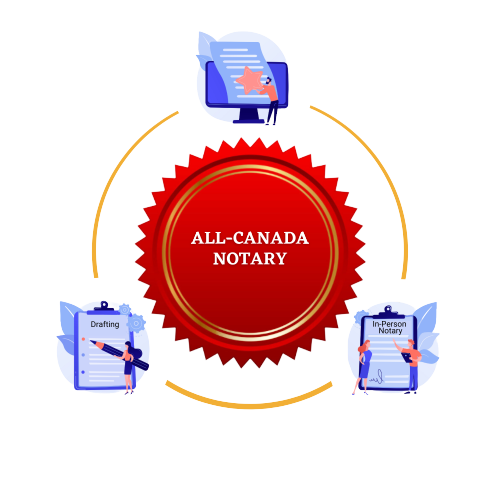What Is a Power of Attorney and Does It Need to Be Notarized in Canada
If you’re like most Canadians, you probably don’t think about the power of attorney until you really need it. But what is a power of attorney? Why do I need it? And when should I use it?
This legal document allows someone to act on your behalf in certain situations, such as if you become incapacitated. It’s an important document to have, especially when you get old. That is, this can be extremely helpful in situations where the person with power of attorney is unable to make decisions for themselves.
There are different types of power of attorney, each with its own set of rules and regulations. In this blog post, we will discuss the basics of power of attorney in Canada and why it is important for everyone to have one.

What is a power of attorney?
A power of attorney is a legal document that authorizes someone to act on your behalf in certain situations. It can give broad authority to an agent or narrow it down to a specific task, like selling property or signing documents. The person granting the POA (principal) must be mentally competent at the time of signing and understand what they’re doing when they sign this document so you know if it’s valid before executing any transactions with them as their representative!
The principal may revoke a power of attorney by informing their agent orally or in writing – but only if both parties agree; otherwise, execution becomes ineffective immediately upon revocation since no longer giving permission for another person (acting as a proxy).
Why do I need it?
There are many reasons why someone would need a power of attorney, but here’s what we’re most concerned about:
- Unavailability: To protect your interests and assets from being misused or taken advantage of by others when you are unavailable. It’s important to have someone who can act as your agent if you’re unavailable due to illness, travel, or other circumstances.
- Incapacity: If you become incapacitated and unable to act if something happens, like an accident or a disease, it’s essential that there is another person who can take care of all the legal affairs and personal care for which you would normally be responsible in order for them not to be neglected due to this unfortunate situation.
There are many reasons why people choose not to have a POA – but these are some pretty good ones! It’s important to understand what this document does and how it can help protect your interests before deciding whether or not to sign one.
Types of Power of Attorney
There are primarily two types of power of attorney in Canada – power of attorney for property and power of attorney for personal care.
1. What is POA for the property?
A power of attorney for property allows another person to make decisions related to your finances and assets. This includes
- Signing cheques
- Buying and selling property
- Refinancing property
- Paying bills and taxes on your behalf
- Making investments with funds from bank accounts or investments that belong to you as well as other types of financial transactions like loans which require signatures from both parties – but only if they’re authorized by law-abiding individuals who are given authority through this document.
It also offers protection against financial abuse (such as fraud) if someone else becomes responsible for managing funds which are then taken advantage of through misappropriation or misuse of assets due to lack of knowledge or involvement by the person who would normally take care of those matters themselves.
2. What is POA for personal care?
A power of attorney for personal care allows another person to make decisions related to your health and wellbeing. For example, they can sign documents that say where you want medical treatment if necessary – even when there isn’t enough time left in a hospital stay before being discharged from it (such as with end-of-life planning). This type is used by people suffering from a disease like Alzheimer’s or dementia, which compromises their decision-making abilities.
What if I don’t have a POA?
If you don’t have a POA and something happens, the court will appoint someone to manage your affairs for you. This could be costly, time-consuming, and cause a lot of stress for you and your loved ones. It’s much better to take care of this ahead of time so that you know who is making decisions on your behalf if you’re unable to do so yourself.
What are the signing requirements for POA?
In order to be valid, a POA must include:
- The name of each person signing at the bottom (not just their initials)
- Their address where they live or work in case there are any questions about who it is from later on
- The date the document was signed
- A statement that the person signing is of sound mind and not under duress or undue influence when they sign it. It’s a good idea to have this witnessed by someone who can attest to this if necessary
Witnesses for POA
In order to be valid, a POA must be signed by at least two witnesses who are not named as attorneys or beneficiaries under the document. If one of them is acting jointly on behalf when signing, then only one witness would need to sign without another person being present (unless required by law). The witness should also say their name and address where they live or work, so there’s proof that it was them witnessing you sign this legal document which gives someone else power over your finances, assets, etc.
Who can not be a witness?
The witness can’t be someone who is under 18 years old, mentally incompetent, or an employee at the bank where your money is being held. They also cannot have any financial interest in the document (e.g., if they become a beneficiary).
Do I need to notarize the POA?
The power of attorney can be a legal and important document, but it’s not necessary to have the signing verified if you’re able. However there are good reasons for doing so- firstly ensuring that your signature on an official-looking piece of paper is genuine; secondly eradicating any issues or confusion when dealing with other parties who may contest what they believe is happening (such as family members).
At All-Canada Notary we can help you with drafting and notarizing a Power of Attorney. Our services are fast and affordable. Book now http://allcanadanotary.com/notary-drafting/

